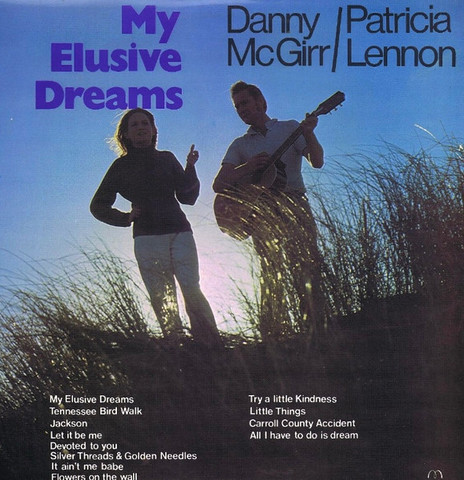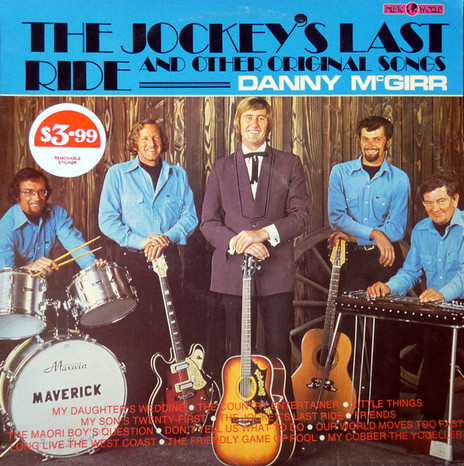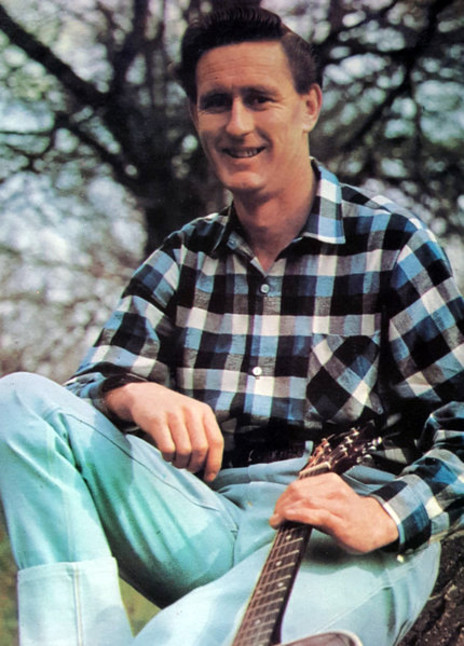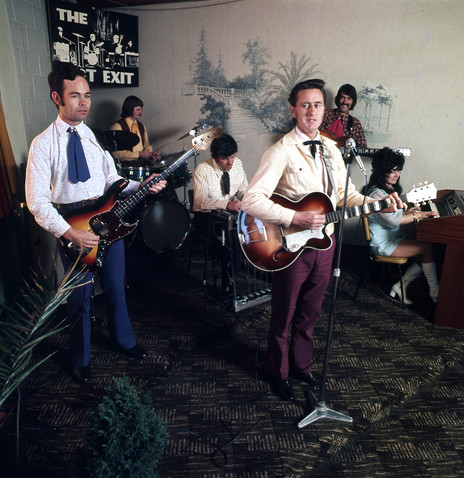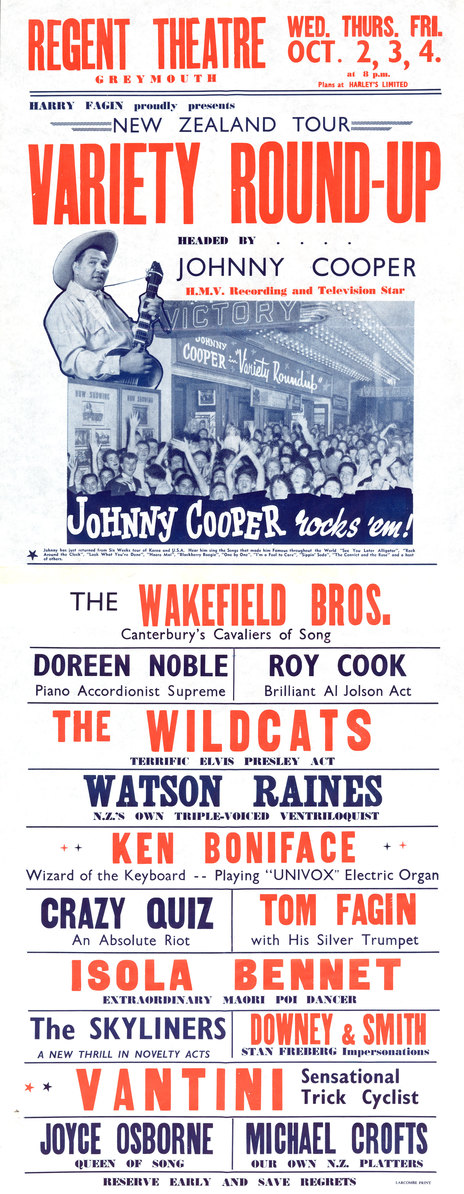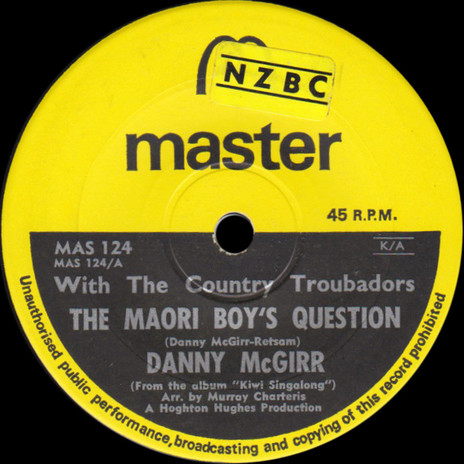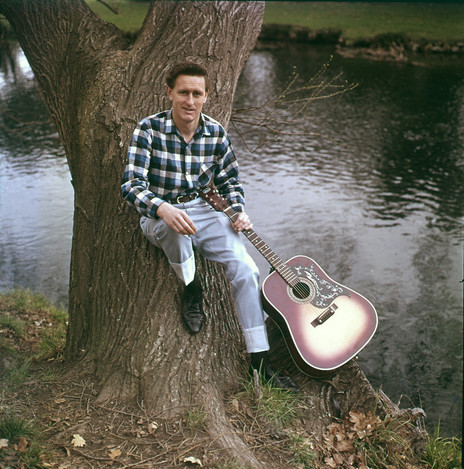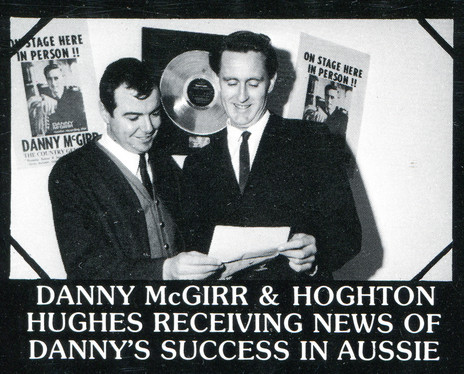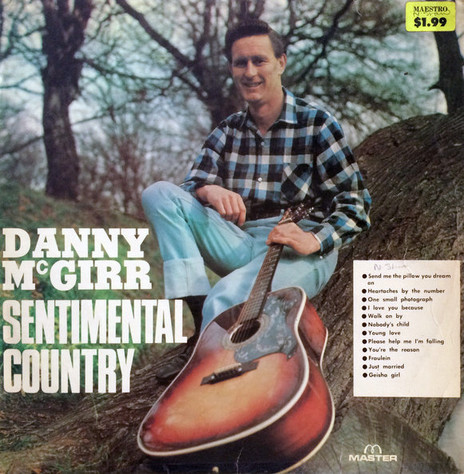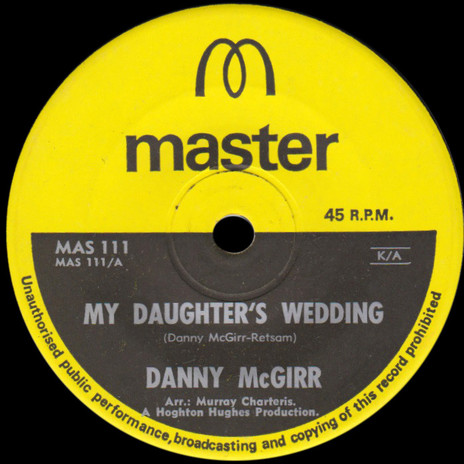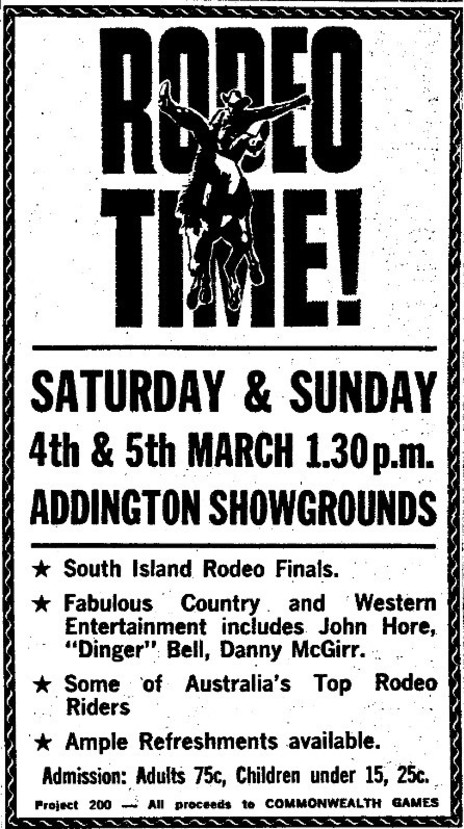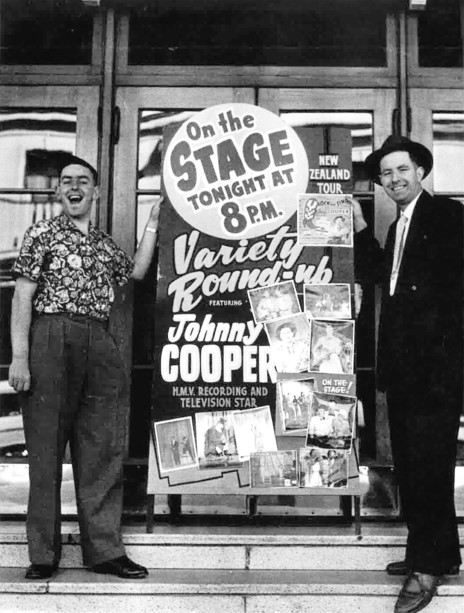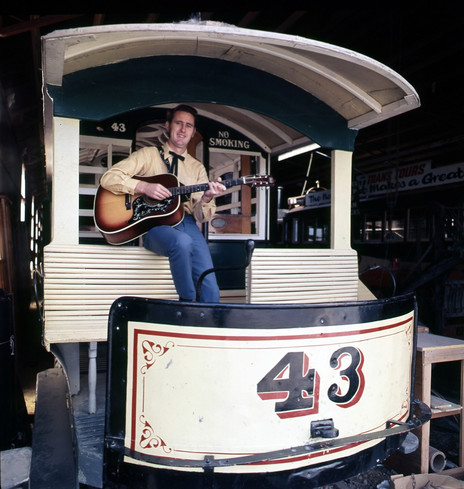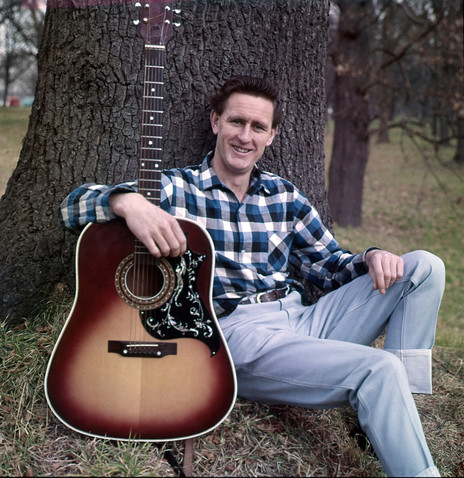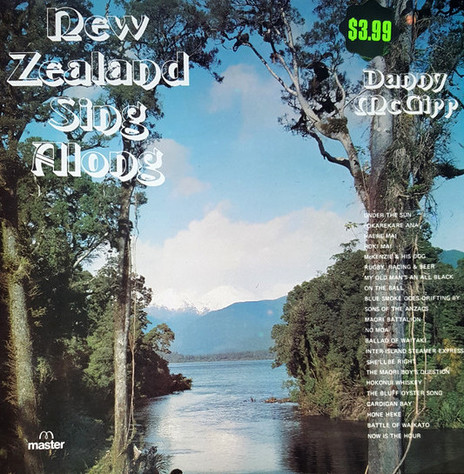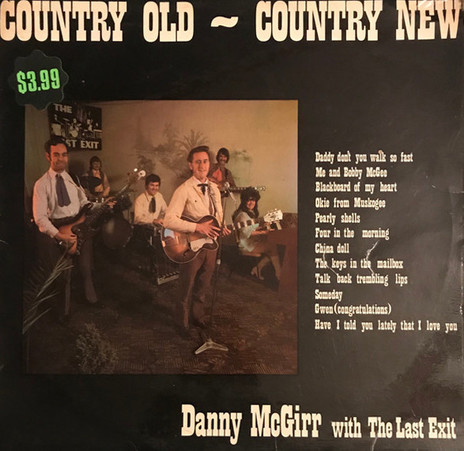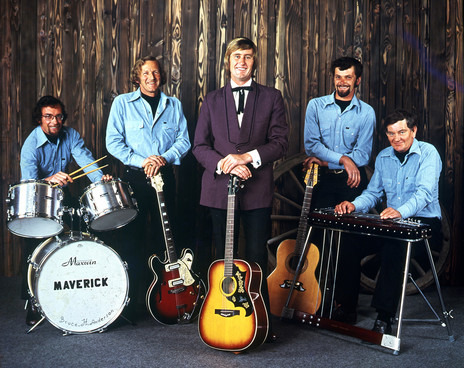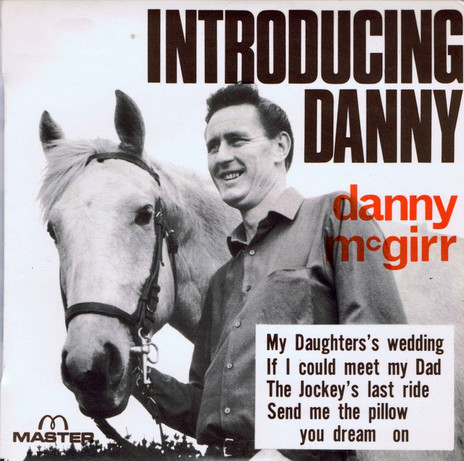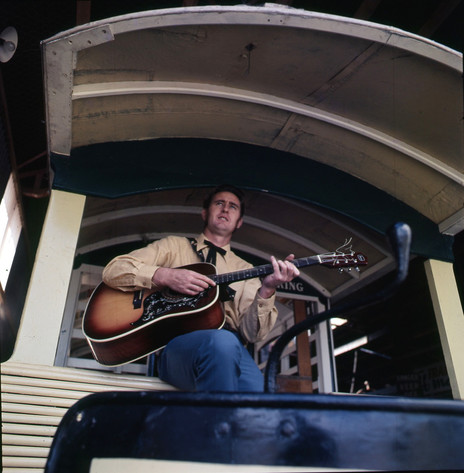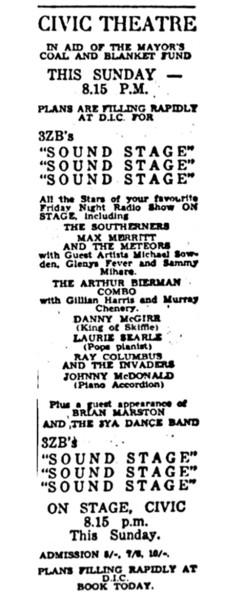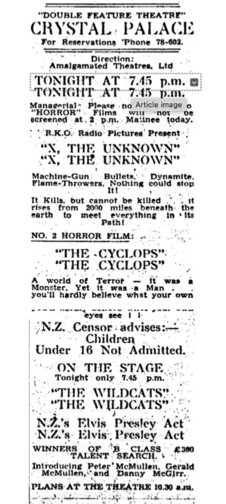Two of McGirr’s biggest songs were the request-show favourites ‘The Māori Boy’s Question’ and ‘The Jockey’s Last Ride’. The former starred the cheeky young fulla who stumped a panel of international quizmasters with the query, “Why does a red cow have white milk when it’s always eating green grass?”
‘The Jockey’s Last Ride’ followed a boy in his first cup ride all the way from the jockey’s room to the finishing post. The song has no chorus and every other of its nine verses descends to the six-major chord, increasing the tension and seemingly the pace of the riders in the race. Danny McGirr wrote from experience: he was an apprentice jockey until he got too tall.
That’s not to say that he wasn’t at the mercy of his record company to record what they thought would sell. His debut album was a collection of country standards, and his biggest seller was Kiwi Sing-A-Long on which he covered everything from The Howard Morrison Quartet to ‘Blue Smoke’.
A 29-year-old father of four when “discovered” by Master Records label boss Hoghton Hughes in 1969, McGirr had already appeared alongside New Zealand rock’n’roll pioneers Johnny Cooper and Johnny Devlin, was frequently billed as “New Zealand’s king of skiffle” and was a finalist on the national NZBC Have A Shot talent quest.
AGED 15, MCGIRR saw AUSTRALIAN C&W STAR BUDDY WILLIAMS PERFORM
Daniel McGirr was born in Christchurch on 16 January 1940. His earliest memories were of his mother singing while playing piano, and his father blowing on a mouth organ or manhandling a squeeze box. His older sister danced and sang Irish songs and won the New Zealand Rose Of Tralee singing competition; his younger sister tap-danced.
Danny sang in the choir and learnt some piano at St Joseph’s School. He was 15 when his mother collected him from his bed and took him to a party across the road where touring Australian C&W star Buddy Williams was singing and playing guitar. It was an epiphany for the youngster, and he soon had a guitar of his own, purchased by his mother from Begg’s.
With nobody around to teach him how to play the instrument, McGirr took every opportunity to peer through the hedge of a Māori family down the road that often sang and played guitars. It didn’t take long until the boy was spotted and, once he confessed that he had one of his own, was encouraged to fetch his guitar and join in. Here he learned his earliest chords and a fair bit about harmony singing.
McGirr left school with the intention of becoming a jockey. However, after only 12 months he was told he would be too tall and was turned away from the stables. But while there he wrote one of his most enduring songs, ‘The Jockey’s Last Ride’, in honour of a couple of boys who were killed while riding.
Back home, he sought solace in music and joined with guitar-playing neighbours Peter and Gerald McMullen to form The Wildcats. In 1957, they won Trevor King’s B Class £300 Talent Quest, and by the middle of the year they were being billed as “NZ’s Elvis Presley Act” at the Crystal Palace Theatre.
They toured the West Coast with rock’n’roll pioneer Johnny Cooper in a package show that also included the harmony-singing Wakefield Brothers, Māori baritone singer Charlie Barrett, an accordion virtuoso, an Al Jolson imitator, a trick cyclist, and a poi dancer.
Around the same time, Max Merritt and The Meteors and The Saints were bringing rock’n’roll to Christchurch teenagers at venues such as the various Teenage Club halls and the Hibernian Hall. Although Peter McMullen would later join guitarist Pat Neho (real name Rongo Nehoneho) in The Saints, Danny McGirr chose a different path.
Upon discovering the skiffle music of Lonnie Donegan, he of ‘Rock Island Line’ and ‘Does Your Chewing Gum Lose Its Flavour (On the Bedpost Overnight?)’ fame, and Nancy Whiskey, McGirr enlisted a banjo-ukulele player, a tea-chest bass player and a washboard player and formed The Harlequin Skiffle Group. It was a lot cheaper than buying amplifiers and flash instruments.
By October 1960, McGirr was being touted as New Zealand’s Lonnie Donegan
In April 1959, The Harlequin Skiffle Group competed in the semi-finals of Joe Brown’s Radio Search For Stars at the Civic Theatre, and by the time of the Johnny Devlin Show at the Theatre Royal in October 1960, McGirr was being touted as New Zealand’s Lonnie Donegan. In 1963 he was advertised in The Press as the nation’s king of skiffle.
A year later, he had returned to the country music he had enjoyed as a child on the Sunday request shows. When he appeared on the final of TV show Have A Shot in 1964, Daniel McGirr performed Marty Robbins’ ‘Devil Woman’ and the standard ‘Nobody’s Child’, backed by The Doug Caldwell Trio.
Having spent the remainder of the decade playing regularly at Christchurch’s pubs, halls and night spots, McGirr was signed to Master Records in 1969 after appearing on Irish tenor Patrick O’Hagan’s stage show and making his debut on 3ZB’s 1100 Country & Western Show. Master had released teenager Brendan Dugan’s first records in 1968 but he had departed for HMV after winning the New Faces competition on TV’s Studio One.
The label’s owner Hoghton Hughes produced McGirr’s first singles – ‘My Daughter’s Wedding’ b/w ‘The Jockey’s Last Ride’ (both written by McGirr) and ‘If I Could Meet My Dad’ b/w ‘(Try To Forget) That One Small Photograph Of You’ – most of which also appeared on the EP Introducing Danny the following year and on later LPs.
Still reliant on the primitive chord shapes he’d learnt from a neighbour as a young boy, McGirr would sing his self-written songs to arranger and pedal steel guitarist Murray Charteris, who would transcribe the chords and chart the material for the band.
Three albums were released in 1970 – Sentimental Country, Kiwi Sing-A-Long and The Jockey’s Last Ride And Other Songs, all produced by Hughes and arranged by Charteris. The music within was pretty much as suggested by the title, but the latter was all songs written by McGirr. They would continue to be repackaged and sometimes slightly retitled and re-released on Hughes’ Music World label in the ensuing decades.
MCGIRR WORKED ALONGSIDE JOHN HORE, CHRISTINE SMITH, DINGER BELL, AND GARNER WAYNE
In 1971 came the LPs My Elusive Dreams – a collection of duets with Ashburton singer Patricia Lennon, and The Best Of Danny McGirr. They were followed two years later by Country Old – Country New, credited to Danny McGirr and The Last Exit, the band of Murray Charteris and his wife Averill. Sides of the record were labelled The “New” Side and The “Old” Side.
McGirr appeared on the Tex Morton-hosted The Country Touch TV show and during the late 1960s and 1970s worked in concert alongside the likes of John Hore (John Grenell), Christine Smith, Dinger Bell, Garner Wayne and Max McCauley. For many years, he was a mainstay of the annual Carnival Capers event put on by song-and-dance teacher Rosemary Hewstone.
Fronting the band Maverick, sometimes advertised as The Mavericks, McGirr held residencies at many Christchurch venues, including the Masonic Hotel in Southbrook, and the Junction Hotel in Rangiora. Throughout his music career, he played rugby league into his 50s for Halswell RLFC and Ashley-Addington. His footy mates knew him as “Whitebait”.
In August 2007, Danny McGirr celebrated 50 years in the entertainment business with a concert in Christchurch that also featured his children Michael, Darron and Debi, while oldest son Stephen watched on.
